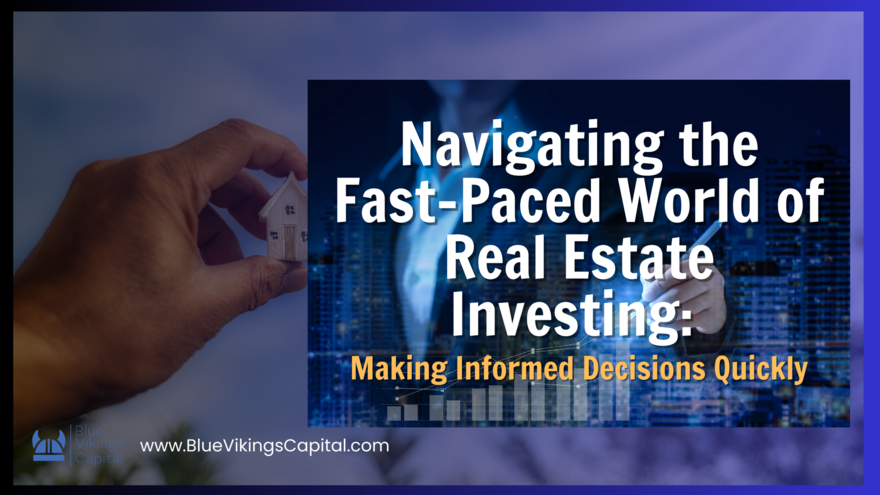Navigating The Fast-Paced World Of Real Estate Investing: Making Informed Decisions Quickly

Have you ever felt the pressure of a ticking clock while making a major investment decision? As we approach the end of the year – the last year with 80% bonus depreciation on real estate that can help you save greatly on your taxes – you may be feel that ticking clock even more.
Everyone is looking for one more good deal to get into before the end of the year. I’ve got a few in the pipeline.
Today, I'm going to reveal why real estate investing, even passive real estate investing, often feels like a race against time. I'm going to show you how to master the art of quick decision-making in real estate investing without compromising on due diligence.

As you may know, most real estate deals close within 45 to 60 days of going under contract, or roughly 6 to 8 weeks. But what happens during this period? Let's break it down. Initially, there's a flurry of activity involving legal agreements, due diligence, and securing loans. Only after these steps can we calculate potential returns and prepare an offering memorandum for potential investors.
Next, we need to schedule a webinar to present this information, market the webinar, and then open the opportunity for investment. So at this point, we are a couple of weeks into that 6-to-8-week time period, so you’d think that means you’d still have 4-6 weeks to decide on whether this opportunity is something you’d like to be a part of.
However, we can't accept investments right before closing. We need to ensure we have sufficient funds to close. This means there will be an investment deadline a couple of weeks before the closing date. So now we are down to a 2-to-4-week time period, but it doesn’t always end there.
Additional factors can compress this timeline.
Let’s talk about accredited versus non-accredited investors for a minute. Being “accredited” simply means that you have a net worth greater than $1M not counting your home, or that you make $200K or more per year alone, or $300,000 filing jointly with a spouse. People that fall into this category can invest in most real estate opportunities as a passive investor if they are invited to do so.
But people who aren’t accredited can also invest, if they have a pre-existing relationship with someone involved with a particular opportunity and the deal sponsors have elected to make it eligible to those investors by classifying the offering as a “Regulation D 506b” offering. There are pros and cons to doing this, so sometimes the deal sponsor might only offer this for a very short time.
After that, they will switch to an accredited-only offering, or “506c”.
Why do deal sponsors often make this switch? It is to be able to provide opportunities for non-accredited investors to get the same returns available to accredited investors, but they don’t want the other constraints that go along with keeping a deal in a 506b status. In that status, the deal can’t be widely advertised – it can only be offered to people already known to the deal sponsors and on their investment lists. That’s a big constraint if you need to raise a lot of money to get a deal closed.
So, to get people they already know into a deal, especially friends and family, sponsors will open it up as a 506b for a very short period, and then switch to a 506c to allow more people in, but those individuals will all need to be accredited and will have to have 3rd party certification of that fact.
Quick tip – if you are accredited and are invited into a deal while in the 506b status, there is a benefit to come into the deal at that time, rather than waiting until it switched over. While it is a 506b, you can self-certify your accreditation status, meaning you won’t have to go to your accountant and get an updated letter each time you invest to show you are still accredited.
Also, keep in mind that if all the investment shares are sold during this initial offering, the switch will never happen, and the opportunity will be lost.
Okay, so if the sponsor is making that switch, it severely cuts the remaining time to non-accredited investors. It also severely cuts the time for accredited investors who weren’t on the deal sponsor’s list, as they only find out about the deal once it is advertised.
So in these instances, you may only have a week or so to decide if you wish to invest, and waiting to the last minute could mean all the spots filling up and you miss out.
I know it's challenging to make quick decisions in such scenarios. No one likes to be rushed when money is involved.
So, how can you prepare for this?
The key is to know in advance what you're looking for in an investment.
To do this, start by scheduling a call with me. I can help you get clear on your investment goals. This includes preferred property types, markets, timelines, tax implications, and desired returns.
I can also get you copies of past deals and webinar recordings. Reviewing these will get you familiar with the terminology and typical deal expectations, without any pressure to invest. You can find more guidance on this in my free book – How to Choose Your First Passive Investment - available on my website – www.BlueVikingsCapital.com
While on the website, make sure to sign up for the Blue Vikings Investment Club so you’ll be the first to know when investment opportunities come out. This will maximize the amount of time you have to review those deals. There are some excellent opportunities just around the corner, so don’t miss this step.
So let’s get acquainted and start aligning your investment goals with the right opportunities. Remember, our introductory call involves no investment offers, so there’s no pressure. It’s all about getting you ready for the right investment. Visit www.BlueVikingsCapital.com to schedule a call with me today.
Together, we can navigate the fast-paced world of real estate investing, ensuring you make well-informed decisions swiftly and confidently. Looking forward to talking with you real soon.


0 comments
Leave a comment
Please log in or register to post a comment